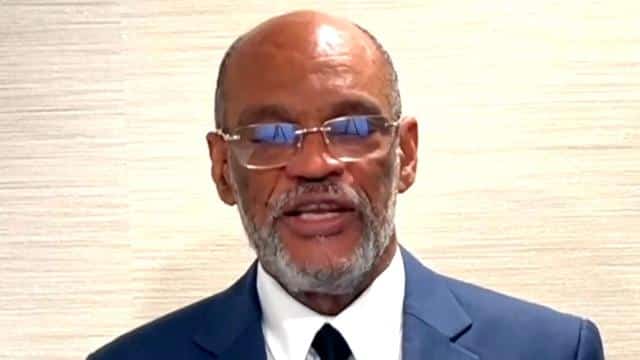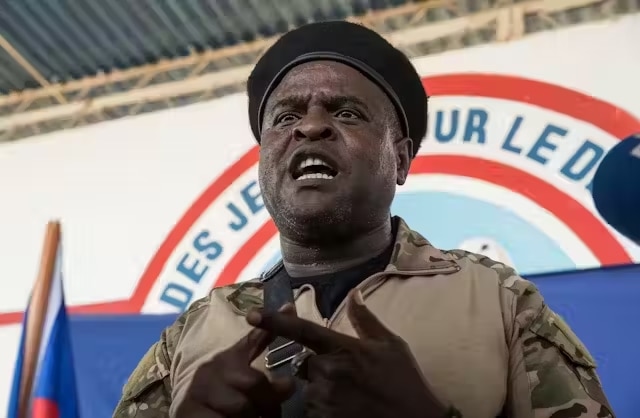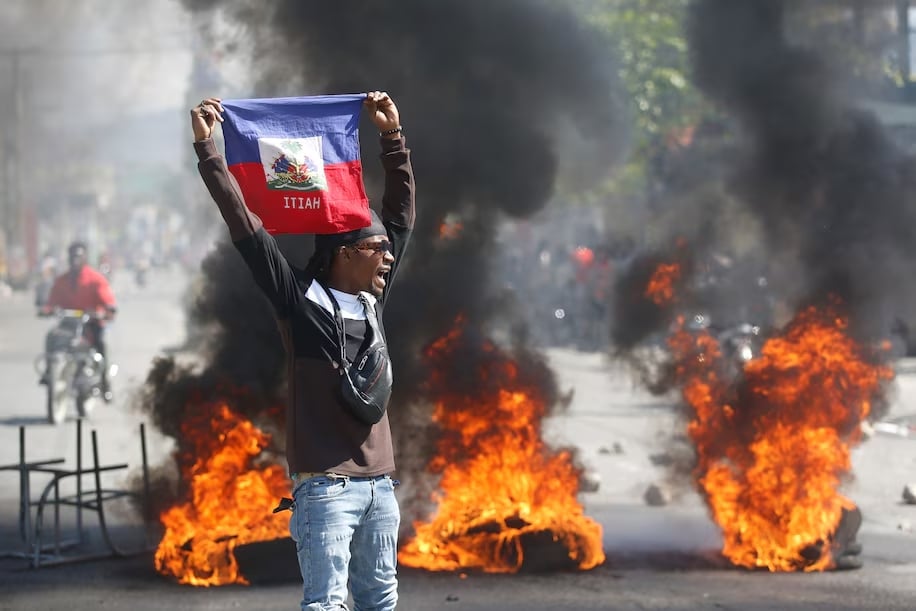Haiti finds itself descending further into turmoil as armed gang members orchestrate a series of bold moves, releasing thousands of prisoners, incinerating government edifices, and compelling the prime minister to seek refuge abroad.
The repercussions of these brazen actions are dire: scores of lives lost, approximately 15,000 individuals displaced from their homes amidst gang onslaughts, and reports of dwindling supplies exacerbating an already precarious situation.
The situation reached a boiling point on 29 February, as Haiti’s formidable criminal factions, already entrenched in large swathes of the economy and dominating the capital, Port-au-Prince, unleashed a coordinated barrage on law enforcement facilities, penitentiaries, and administrative structures.
Prime Minister Ariel Henry finds himself stranded outside the nation’s borders, hemmed in by mounting domestic unrest and international pressure for his resignation. Meanwhile, with gangs asserting control over all major international airports in the capital, the United States has bolstered security around its embassy through additional military deployment. Caribbean leaders, convening in Jamaica, are earnestly seeking avenues to quell the crisis and restore stability to Haiti.

Sow did it get to this?
In a whirlwind of events this month, the scene was set while Prime Minister Ariel Henry jetted off to Kenya in a bid to rally support for a United Nations initiative, aiming to import 1,000 Kenyan police officers to bolster Haiti’s security.
Then, on 28 February, amid escalating tensions, leaders of Caricom – a dynamic coalition of 15 Caribbean nations and territories – announced Henry’s commitment to hold elections by mid-2025, following two prior unfulfilled pledges.
The precise trigger for Haiti’s formidable criminal syndicates to unleash chaos remains elusive. Yet, the very next day, a maelstrom of violence erupted, claiming the lives of at least four law enforcement officers, prompting closures of airports, businesses, and schools, and compelling countless Haitians to flee their homes.
In a chilling recorded address, notorious gang leader and former cop Jimmy Chérizier, fondly known as “Barbecue,” vowed to apprehend government officials and bar Henry from reentering the nation, rallying under the banner of revolution rather than mere criminality.
As night fell on Saturday, a stunning jailbreak unfolded at Haiti’s national penitentiary, liberating nearly all of its approximately 4,000 inmates. Tragically, three individuals were discovered fatally wounded outside the facility, with another prison housing 1,400 inmates falling under gang control.
Haitian government officials, in a somewhat unassuring statement, acknowledged the challenges faced by law enforcement in containing the rampaging criminals, as they seized numerous prisoners, leaving chaos and destruction in their wake.
Amidst this tumult, a small faction of inmates, including the 18 Colombian mercenaries implicated in the assassination of former Haitian President Jovenel Moïse in 2021, opted to remain incarcerated, fearing reprisals outside the prison walls.
Since Moïse’s untimely demise, Haiti has been besieged by rampant gang violence, with homicides soaring to nearly 5,000 in 2023, as per a damning UN report – doubling the previous year’s toll.
In a bid to regain control, Acting Prime Minister Michel Patrick Boisvert declared a state of emergency and imposed an evening curfew. However, by Sunday 10 March, the government continued to grapple with sporadic gunfire echoing through Port-au-Prince, while ordinary citizens found themselves grappling with dwindling essentials.

How did Haiti’s criminal gangs arrived here?
On a fateful afternoon, November 13th, 2018, the quiet streets of Port-au-Prince’s La Saline neighborhood were shattered by the arrival of a police armored vehicle, disgorging armed men, some clad in official uniforms. What unfolded next stands as one of Haiti’s darkest chapters in recent memory. A harrowing report from human rights observers tallied a grim toll: at least 71 lives lost, 11 women subjected to unspeakable horrors, and 150 homes ravaged by looting and flames.
Haiti’s historical narrative is one of resilience amid adversity, yet beset by persistent challenges. Born in 1804 from the valor of Black revolutionaries who shattered the chains of slavery, the nation was soon ensnared in a cycle of hardship. Compounded by a forced indemnity to French former slaveholders, Haiti’s debt shackled its progress for over a century.
The symbiotic relationship between Haitian politicians and armed factions traces back to the infamous dictator François “Papa Doc” Duvalier, who birthed the paramilitary force known as the Tonton Macoute. Even after the Duvalier era, Haiti’s tumultuous journey witnessed military coups and foreign interventions, leaving a legacy of instability.
Disbanding the Haitian military in 1995 unraveled a new conundrum, as thousands of armed men found themselves adrift, amidst a landscape of political volatility. The vacuum of power saw civilian militias thwarting coups, underscoring the blurred lines between order and chaos.
Caught between Latin America and the US, Haiti became a strategic hub for drug trafficking, fueling the coffers of burgeoning criminal enterprises. Despite glimmers of progress under leaders like René Préval, seismic events like the catastrophic 2010 earthquake decimated the economy and paved the way for the resurgence of gangs.
In the aftermath, democratic governance eroded, with accusations of power consolidation and constitutional violations levied against President Moïse. His assassination, shrouded in mystery, hinted at a web of political intrigue and narcotic entanglements.
Amidst this tumult, Prime Minister Ariel Henry’s administration grapples with the specter of gang violence, hampering efforts to conduct fair elections. A precarious balance teeters between the imperative of security and the urgency of democratic legitimacy.
Enter Jimmy Chérizier, once a law enforcement officer turned vigilante, striding through La Saline’s alleyways, flanked by armed guards and surveilled by hovering drones. His scathing indictment of the Henry government underscores a crisis of authority, as legitimacy wanes in the face of rampant violence.
The narrative pivots to Chérizier, implicated as the orchestrator of the La Saline massacre, allegedly acting in concert with senior politicians seeking retribution against dissenting voices. It is a grim testament to the unholy alliance between state actors and criminal elements, perpetuating a cycle of bloodshed and impunity.
What is happening now?
midst the unfolding drama, on Monday, US Secretary of State Antony Blinken was in Jamaica for an urgent Caricom summit, hoping to untangle the threads of crisis enveloping Haiti. Whether Prime Minister Henry snagged an invite to this high-stakes gathering remains shrouded in mystery, adding a layer of intrigue to an already tense affair.
As discussions swirl, one potential antidote emerges: Henry’s resignation, paving the way for a transitional council to usher in a new era of governance. This council would orchestrate the selection of an interim president and facilitate Haiti’s long-awaited rendezvous with democratic elections, a ghost from the past haunting the nation since 2016.
Yet, amidst diplomatic maneuvering, the specter of violence looms large, casting a shadow of doubt over the feasibility of fair and open elections. In a nation where armed factions wield sway over the corridors of power, the notion of electoral integrity feels like a distant dream.
Across the ocean, the United Nations has hatched a plan of intervention, championing the deployment of 1,000 Kenyan peacekeepers to Haiti’s troubled shores. However, this ambitious proposal faces a formidable array of obstacles. Not only has Kenya’s High Court slammed the brakes, deeming the plan unconstitutional, but the sheer numerical shortfall—1,000 officers versus a staggering 3,300 Haitian deserters—threatens to undermine the mission’s efficacy from the outset.
Compounding matters, the funds for this endeavor are less than overflowing: the US extends a modest pledge, barely scraping past $200 million, while Canada offers a comparably meager $80 million.
As the dust settles, the future of Haiti hangs precariously in the balance, with the fate of its populace teetering on the brink of uncertainty. The daunting question remains: will Haiti emerge from this crucible of chaos unscathed, or will its trajectory veer further into the abyss of instability? Only time will tell.
UPDATE: Prime Minster Resigned
Haiti’s harassed Prime Minister, Ariel Henry, dropped a bombshell late on Monday, announcing his impending resignation. This seismic decision is set to take effect once a transition council and interim successor have been duly appointed.
Henry’s bombshell came on the heels of a high-stakes summit held in Jamaica, where a flurry of officials—including Caribbean dignitaries and the ever-vigilant US Secretary of State, Antony Blinken—convened urgently to tackle Haiti’s escalating woes.
In a candid video address quoted by Reuters, Henry expressed his intent, stating, “The government that I am leading will resign immediately after the installation of (a transition) council,” Henry said in a video address quoted by the Reuters news agency. “I want to thank the Haitian people for the opportunity I had been granted.”
“I’m asking all Haitians to remain calm and do everything they can for peace and stability to come back as fast as possible,” he added.
He is to remain in Puerto Rico for now, according to the United States.

